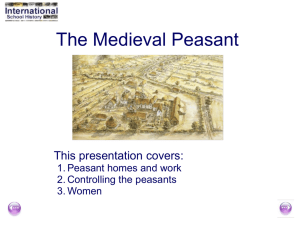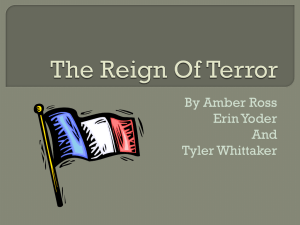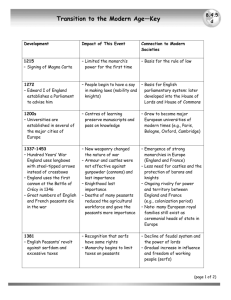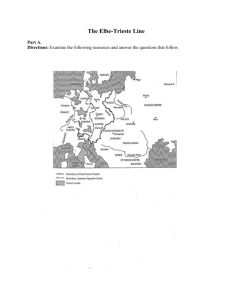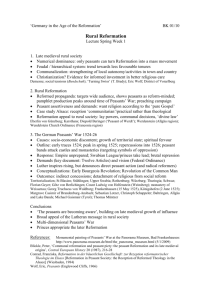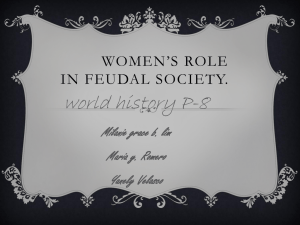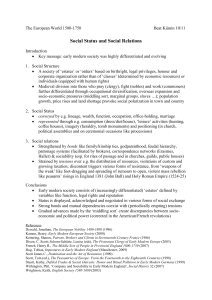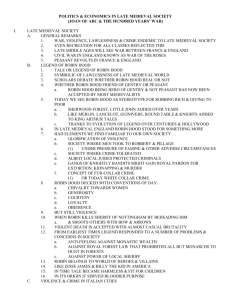One Revolt, Many Causes
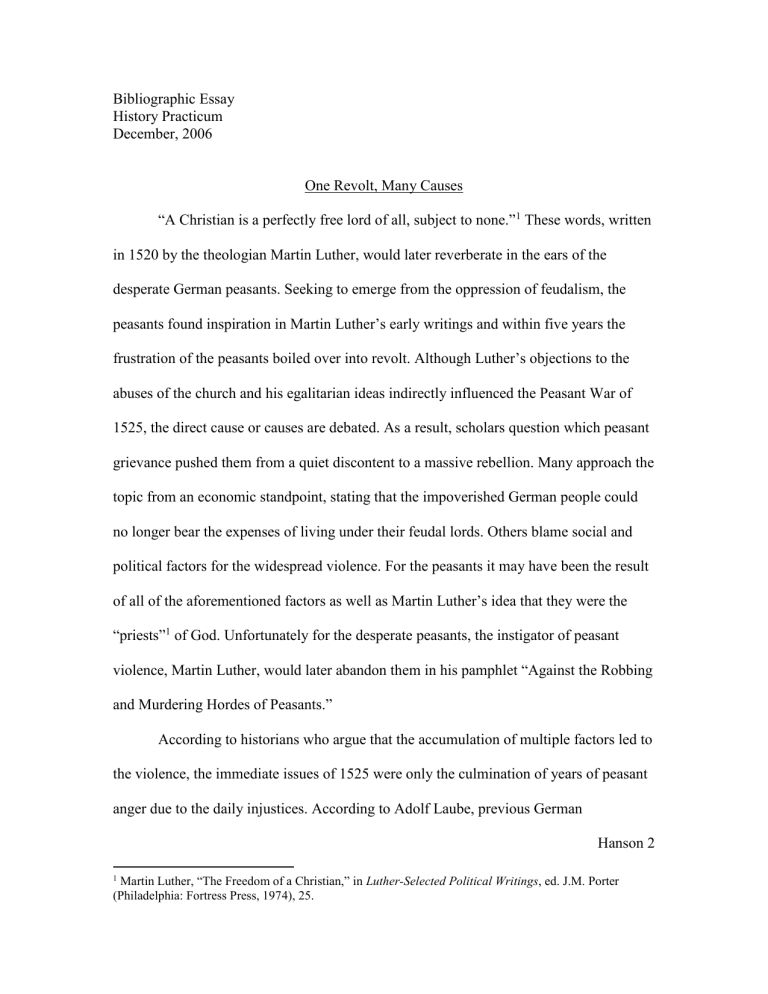
Bibliographic Essay
History Practicum
December, 2006
One Revolt, Many Causes
“A Christian is a perfectly free lord of all, subject to none.” 1
These words, written in 1520 by the theologian Martin Luther, would later reverberate in the ears of the desperate German peasants. Seeking to emerge from the oppression of feudalism, the peasants found inspiration in Martin Luther’s early writings and within five years the frustration of the peasants boiled over into revolt. Although Luther’s objections to the abuses of the church and his egalitarian ideas indirectly influenced the Peasant War of
1525, the direct cause or causes are debated. As a result, scholars question which peasant grievance pushed them from a quiet discontent to a massive rebellion. Many approach the topic from an economic standpoint, stating that the impoverished German people could no longer bear the expenses of living under their feudal lords. Others blame social and political factors for the widespread violence. For the peasants it may have been the result of all of the aforementioned factors as well as Martin Luther’s idea that they were the
“priests” 1
of God. Unfortunately for the desperate peasants, the instigator of peasant violence, Martin Luther, would later abandon them in his pamphlet “Against the Robbing and Murdering Hordes of Peasants.”
According to historians who argue that the accumulation of multiple factors led to the violence, the immediate issues of 1525 were only the culmination of years of peasant anger due to the daily injustices. According to Adolf Laube, previous German
Hanson 2
1 Martin Luther, “The Freedom of a Christian,” in Luther-Selected Political Writings , ed. J.M. Porter
(Philadelphia: Fortress Press, 1974), 25.
movements, such as the Bundschuh and Armer Konrad, became signs of peasant dissatisfaction and revolt in the fifteenth century. In 1502 the Bundschuh movement gained strength under the leadership of Joss Fritz, and although it was suppressed before it started, “the memory of the Bundschuh stayed alive and continued to inspire peasant fighters in the battles of the Peasant War.” 2
The past experiences of the peasants fueled their contempt for the old order, inciting them to arm themselves and rebel. Similarly to
Laube, Peter Blickle argues that the events that preceded the Peasant War of 1525 laid the foundations for this massive peasant revolt. Blickle argues that “most of the basic conflicts are connected with serfdom, which placed heavy burdens on the peasant economy.” Although economic tensions are his main argument, Blickle’s case concludes that “the economic difficulties, the social tensions and the political pressures added up to a critical situation.” 3 All of these factors led to the continued exploitation of the peasant class, resulting in a growing tendency towards violence against the social hierarchy.
From a Marxist viewpoint historians argue that the peasants’ actions can best be described through economics. The economic struggles of the peasants drove them to extreme measures, causing them to take arms against their oppressors. Luther’s initial writings often “dealt explicitly with an economic issue” which appealed to the poverty stricken sensitivities of the peasants and “discussed the various uses, social and otherwise, of monastic property.” Luther’s calls for economic reform gained support
Hanson 3
2 Adolf Laube, “Precursors of the Peasant War: ‘Bundschuh’ and ‘Armer Konrad’-Popular Movements at the Eve of the Reformation,” in
The German Peasant War of 1525, ed. Janos Bak (London: Frank Cass,
1976), 49-53.
3 Peter Blickle, “The Economic, Social and Political Background of the Twelve Articles of the Swabian
Peasants of 1525,” in The German Peasant War of 1525, ed. Janos Bak (London: Frank Cass, 1976), 62-74.
from much of the peasant class, creating a strong backing for his movement. This move of garnering support “was a gesture to the gallery, and he was as much aware of it as have been subsequent historians.” 4
According to the economic approach, Luther used his writings to promote an economic fairness in society, resulting in a stronger support from the people and therefore greater influence. These writings then inspired the peasants to revolt against the financial hardships they had been forced to live under their entire lives.
Writing from the study of Friedrich Engels’ approach to the Peasant War, Janos Bak cites economic issues as the main cause of the Peasant Revolt. Through Engels, Bak portrays the Peasant War as “an early, immature bourgeois revolution.” The attempts of the
German peasants to overthrow the feudal system that had subjugated them for centuries was clearly the result of economic burdens according to this Marxist approach. The people had tired of the feudal stage of history and longed for a more promising economic era.
5
Social factors also played a critical role in the revolt that would ensue. The egalitarian dream created by Luther’s words “electrified and mobilized peasants everywhere.” The peasants no longer believed in the authority of the old order, instead they attempted to establish a new order, based on social equality. The conflict that followed was seen by many as a result of Luther’s writings, who “had kindled this fight, which consequently, and because of him, grew into a fiery and bloody confrontation.” 6
Hanson 4
4 Hans J. Hillerbrand, “The German Reformation and the Peasants’ War,” in The Social History of the
Reformation, ed. Lawrence P. Buck and Jonathan W. Zophy (Colombus: Ohio State University Press,
1972), 108-126.
5 Janos Bak, “ ‘The Peasant War in Germany’ by Friedrich Engels- 125 years after,” in The German
Peasant War of 1525, ed. Janos Bak (London: Frank Cass, 1976), 89-95.
6 Heiko A. Oberman, “The Gospel of Social Unrest,” in The German Peasant War of 1525- New
Viewpoints , ed. Bob Scribner and Gerhard Benecke (London: George Allen & Unwin, 1979), 39-51
The social constraints of feudalism allowed the peasants’ anger to build up, and unable to release their frustration in any other way they were forced to seek radical social justice under the guise of religious equality.
Political corruption and abuse in sixteenth century Germany placed great amounts of stress and pressure on the powerless people. The land owning nobles of this period tended to treat their subjects poorly and “the common experience of noble repression, arbitrariness and, not least of all, noble arrogance formed the unifying element for the various segments of rural society.” Once unleashed, the peasants’ dissatisfaction bound them to a single goal: political upheaval. The poor, downtrodden Germans were unified under this hope of a new political order, free from the landlord ruling class that existed at the time.
7
Heide Wunder continues this political approach to the study by citing the peasants’ eagerness to replace the “old law” which had failed them with the “divine law” that had given them hope. No longer willing to abide by the political system that left them behind, the peasants sought a new, unrestricted political system based on the natural laws of God. The feudal law that had governed them “was an expression of the political and legal powerlessness of the peasantry.” 8
The hopes for a new political establishment based upon Martin Luther’s egalitarian writings offered inspiration to the peasants in their battle against the “old law.”
Historians who argue exclusively for their bias tend to ignore evidence that contradicts their conclusions. The Peasant War of 1525 does not need to be simplified to
Hanson 5
7 Heide Wunder, “The Mentality of Rebellious Peasants- the Samland Peasant Rebellion of 1525,” in The
German Peasant War of 1525- New Viewpoints , ed. Bob Scribner and Gerhard Benecke (London: George
Allen & Unwin, 1979), 155-156.
8 Heide Wunder, “‘Old Law’ and ‘Divine Law’ in the German Peasant War,” in The German Peasant War of 1525, ed. Janos Bak (London: Frank Cass, 1976), 58.
a single cause. An event of such great magnitude can only be the sum of many parts. No matter the fluctuating importance of the various causes amongst the peasants, one thing remained constant: Luther’s role in inspiring the Peasants’ Revolt. As noted by the historian Peter Blickle, “The cause of the rebellion was, rather, the destruction and suppression of love, peace, and unity- in short, the suppression of the gospel and of God’s will.” 9
The religious offerings of Martin Luther acted to unify the secular causes of the revolt under one motivation. Despite his role in its cause, Martin Luther was also pivotal in its disastrous ending. Employing the same tactics he used to gain the support of the peasants, Martin Luther turned his back on the revolting peasantry with his “Against the
Robbing and Murderous Hordes of Peasants.” Luther wrote to the nobles and told them that he would “not oppose a ruler who, even though he does not tolerate the gospel, will smite and punish these peasants without first offering to submit the case to judgment.” 10
Using the power of the written word Luther gave the temporal lords the judicial power of
God and ensured the slaughter of thousands of peasants, rebellious or not. Though an inspirational force in uniting the angry peasants and inciting revolt, Martin Luther’s most important role may have been his guilt in its bloody end.
9 Peter Blickle, The Revolution of 1525 (Baltimore and London: The Johns Hopkins University and Press,
1981) 19.
10 Martin Luther, “Against the Robbing and Murdering Hordes of Peasants,” in Luther-Selected Political
Writings , ed. J.M. Porter (Philadelphia: Fortress Press, 1974), 87.
Annotated Bibliography
1.
Bak, Janos. “ ‘The Peasant War in Germany’ by Friedrich Engels- 125 years after.” In
The German Peasant War of 1525, edited by Janos Bak. London: Frank Cass,
1976.
The argument by Bak is through a Marxist lens, analyzing the history and causes of the peasant revolt through the findings of Friedrich Engels. As a result, Bak claims that the economic burdens involved in the life of a sixteenth century peasant caused the mass uprisings. Throughout his argument Bak cites evidence from Engels’ writings to support his own theory. This heavy bias clouds Bak’s ability to objectively look at the material and evidence from the Peasants’ Revolt. Instead Bak chooses to bend the evidence that
Engels’ along with the evidence that he has found in order to make it clearly seem like a result of economic factors. Although he does make many valid points on the economic ramifications of the feudal system he leaves much evidence out.
2.
Blickle, Peter. “The Economic, Social and Political Background of the Twelve
Articles of the Swabian Peasants of 1525.” In
The German Peasant War of 1525 , translated and edited by Janos Bak. London: Frank Cass, 1976.
In this paper, Peter Blickle argues that the causes of the Reformation cannot be limited to just one. Throughout the paper Blickle seems to cite economics as the main cause but his evidence for other important social and political factors hinder his economic bias. In his studies Blickle has found that the causes of the Peasants’ War of 1525 were not simply immediate causes to a revolt, they were simply the latest in a series of peasant revolts that had been taking place since the fifteenth century. His notion that the preceding century’s
revolts had laid the foundation for the German peasants in 1525, along with his belief that multiple factors caused the conflict, separate him from other scholars who allow their bias to interfere with the evidence.
3.
Blickle, Peter. The Revolution of 1525 . Translated by Thomas A. Brady, Jr. and H.C.
Erik Midelfort. Baltimore and London: The Johns Hopkins University and Press,
1981.
In this particular article Blickle discusses the unifying nature of Martin Luther’s writings on the Peasant Revolt. Although he clearly admits that there are multiple factors involved in the revolt, Blickle gives credit to religion for being able to bring the different factors together to fight for one cause. This unity was vital for the creation of the Twelve
Articles, a document that organized the peasant goals and mission. By placing religion among the chief factors of the revolt, Blickle gives Martin Luther a key role in the initial riots and places Luther’s gospel among the most influential of factors. Unlike many of the other historians who wrote on the subject, Blickle gives the widest variety of causes for the revolt, not singling out one particular factor and forgetting the rest as many other scholars do.
4. Hillerbrand, Hans J. “The German Reformation and the Peasants’ War.” In
The Social
History of the Reformation , edited by Lawrence P. Buck and Jonathan W. Zophy.
Colombus: Ohio State University Press, 1972.
The article deals with economics and its effects on the peasant mind in the sixteenth century. Along with the economic burdens that had weighed the peasants down for
centuries, Hillerbrand deals with Luther’s role in making a point out of these issues. To
Hillerbrand, Luther is using his writings to garner support for his ideals, support he finds easily in the desperation of the peasants. Luther’s calls for economic reform, the social uses of monastic property, and various other economic issues were simply ways to strengthen his movement. Though many of Luther’s early writings dealt with economics he never offered any solutions to the problems, refusing to adhere theological solutions to the physical economics. Hillerbrand gives a very concise and narrowly focused view on the Peasants’ War. Although he reveals his bias, his work overall is not diminished by the bias.
5. Laube, Adolf. “Precursors of the Peasant War: ‘Bundschuh’ and ‘Armer Konrad’-
Popular Movements at the Eve of the Reformation.” In The German Peasant War of 1525, edited by Janos Bak. London: Frank Cass, 1976.
Revolts from previous centuries laid the foundation for the Peasant War of 1525. Laube is arguing that the socio-economic factors of the fifteenth century created a bitter and rebellious peasantry that initiated peasant violence against the social hierarchy.
According to the paper, the high level of frustration over the nobility and the failed attempts to revolt carried over into the sixteenth century and lay dormant in the peasants, just waiting for a spark. This tendency towards violence allowed the peasants to stage their massive revolt in 1525 after the words of Martin Luther provoked them. The peasant rebellion passed from the hands of the peasants before them, particularly Joss Fritz, who planted the seeds for a large scale uprising. Laube’s approach is accepting of various
methodologies, not limiting his study to just one, therefore conveying more information and possibilities.
6. Luther, Martin. “Against the Robbing and Murdering Hordes of Peasants.” In
Luther-
Selected Political Writings, edited by J.M. Porter and translated by Charles M.
Jacobs. Philadelphia: Fortress Press, 1974.
In this primary document Martin Luther calls for the German nobility to destroy the
Peasant Revolt at all costs. Choosing to forgive the nobility for any actions they may take against the peasants, Luther allows the nobility to act as God’s justice. Written for political reasons to not alienate the powerful nobility, Luther rescinds his previous writings that had inspired the peasants to fight for equality. Luther’s actions in this piece led to the slaughter of thousands of peasants but brought him the continued support of many of the nobility. He was later criticized for the results of the Peasants’ War and blamed for bringing the merciless punishment of the nobles down upon the peasants.
Luther’s interest in retaining the strength of his movement and his desire for order forced him to side with the nobles over the peasants. The document gives insight into the political workings of the Reformation.
7. Luther, Martin. “The Freedom of a Christian.” In
Luther- Selected Political Writings, edited by J.M. Porter and translated by W.A. Lambert. Philadelphia: Fortress
Press, 1974.
This important text offers a glimpse into Martin Luther’s role in motivating the peasants to revolt. Luther grants the privilege of priesthood to all Christians, arguing that the gospels are not designated for the few who make up the clergy but for all who believe.
This egalitarian approach to Christianity inspired the peasants to seek an egalitarian social order to go along with the reforms that Martin Luther wrote about. The importance of this document lies in its initial influence over the peasants, binding them together to create a peasant movement unified under one key factor: religion. This primary document also allows the reader to compare the writings of Luther before the Peasants’ Revolt to his writings after the uprising to see any clear changes in his style and message.
8. Oberman, Heiko A. “The Gospel of Social Unrest.” In The German Peasant War of
1525- New Viewpoints , edited by Bob Scribner and Gerhard Benecke. London:
George Allen & Unwin, 1979.
The argument of this essay deals with the social factors that affected the peasant mindset during the revolt. Oberman argues that the peasants were moved to action by Luther’s words which they saw as calls for social equality. The revolt was an attempt to destroy the old order which had oppressed them for so long and in its stead they would develop a new, egalitarian social structure. The frustration due to social constraints accumulated in the mind of the peasants until it could remain docile no longer. According to Oberman’s standpoint, the social factors continually angered the peasants and pushed them closer to action but Martin Luther’s words acted as the catalyst that set the revolt in motion. The paper’s focus on the social factors of the revolt does not leave much room for interpretation of the evidence supplied.
9. Wunder, Heide. “‘Old Law’ and ‘Divine Law’ in the German Peasant War.” In The
German Peasant War of 1525, edited by Janos Bak. London: Frank Cass, 1976.
This essay offers a look at the political motivations of the Peasant Revolt of 1525. The peasants, tired of the oppression they face under the “old law” are attempting to implement a new, “divine law.” The failings of the old system can be easily replaced by a perfect political system based on the natural laws of God is the point Wunder is arguing.
This eagerness to institute a new political system brings the peasants into rebellion, having to first overthrow the oppression of the old order before the new system can exist.
Wunder does not stray from her main topic of the legal and political motivations of the peasants. The analysis offered on the legal and political practices of the sixteenth century give the reader a glimpse of how the feudal governments of that time worked and how they exploited the peasants.
10. Wunder, Heide. “The Mentality of Rebellious Peasants- the Samland Peasant
Rebellion of 1525.” In
The German Peasant War of 1525- New Viewpoints ,
Edited by Bob Scribner and Gerhard Benecke. London: George Allen & Unwin,
1979.
The essay argues that the political injustices faced by the peasants united them under a common goal. Their desire for a new political system based on equality became more important to them than the social and economic factors that plagued them as well.
According to Wunder the peasants’ actions were dictated by their common need of new leadership. The old feudal system had become obsolete in the eyes of the peasants and they were called to action by the hope of something new. This hope was not limited to a specific region and therefore allowed the peasant movement to grow and spread throughout much of Germany. Wunder’s argument is that the political ambitions of the
peasants were of a higher importance than the social and economic conditions because with a new government those problems could be solved. That argument makes it viable because it encompasses many factors but places the significance on a single one that has the ability to fix all.
